Gardening is a timeless and therapeutic hobby enjoyed by millions around the world. It’s a connection to nature, a source of fresh produce, and a canvas for artistic expression. But for some, traditional gardening can present significant physical challenges. This is where the concept of “Barrier-Free Blooms” comes in – a way to make container gardening accessible and enjoyable for disabled gardeners. In this article, we’ll explore the world of container gardening, a versatile and adaptive approach that opens the door to gardening for everyone.
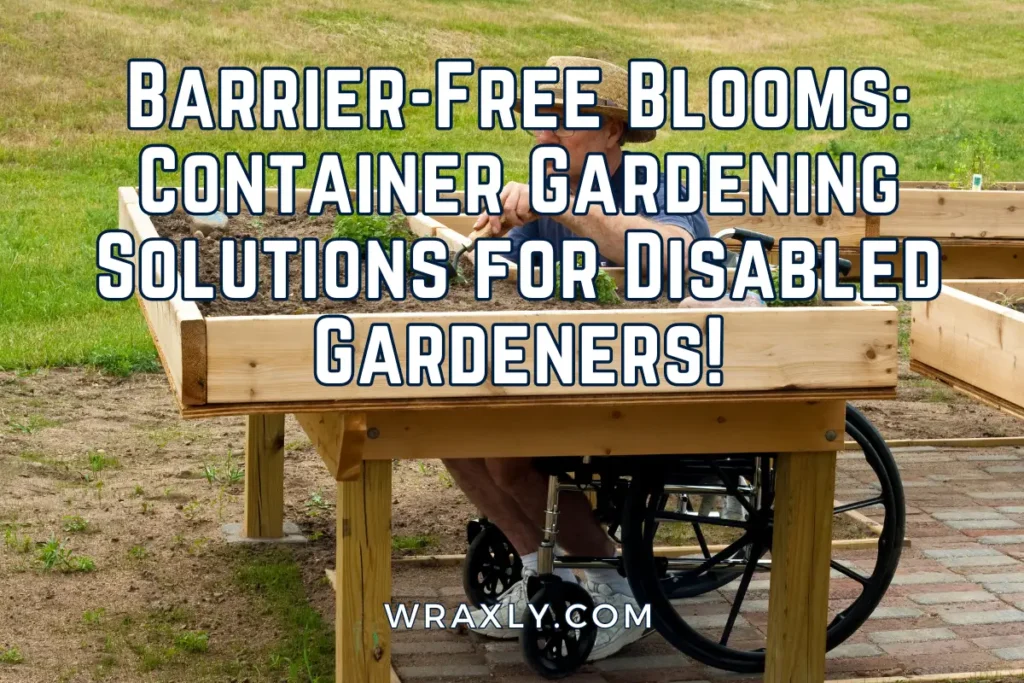
- The Benefits of Container Gardening for Disabled Gardeners
- Understanding the Needs of Disabled Gardeners
- Choosing the Right Containers
- Selecting the Perfect Plants
- Accessible Garden Design
- Essential Tools and Equipment
- Watering and Irrigation Solutions
- Maintenance Made Simple
- Community and Support
- Success Stories: Stories of Triumph in Container Gardening
- Final Thoughts on Container Gardening for Disabled Gardeners
- Additional Resources
The Benefits of Container Gardening for Disabled Gardeners
Container gardening offers a multitude of benefits, making it an excellent choice for gardeners of all abilities. One of its primary advantages is mobility. Containers can be placed at the perfect height and location, allowing wheelchair users or those with limited mobility to garden comfortably. Furthermore, container gardening doesn’t require bending, kneeling, or heavy lifting, making it less physically demanding.
Understanding the Needs of Disabled Gardeners
Disabled gardeners face diverse challenges, from limited mobility to sensory impairments. It’s essential to understand these unique needs to create customized gardening solutions. For example, a visually impaired gardener may need tactile markers, while someone with limited dexterity may require specialized tools.
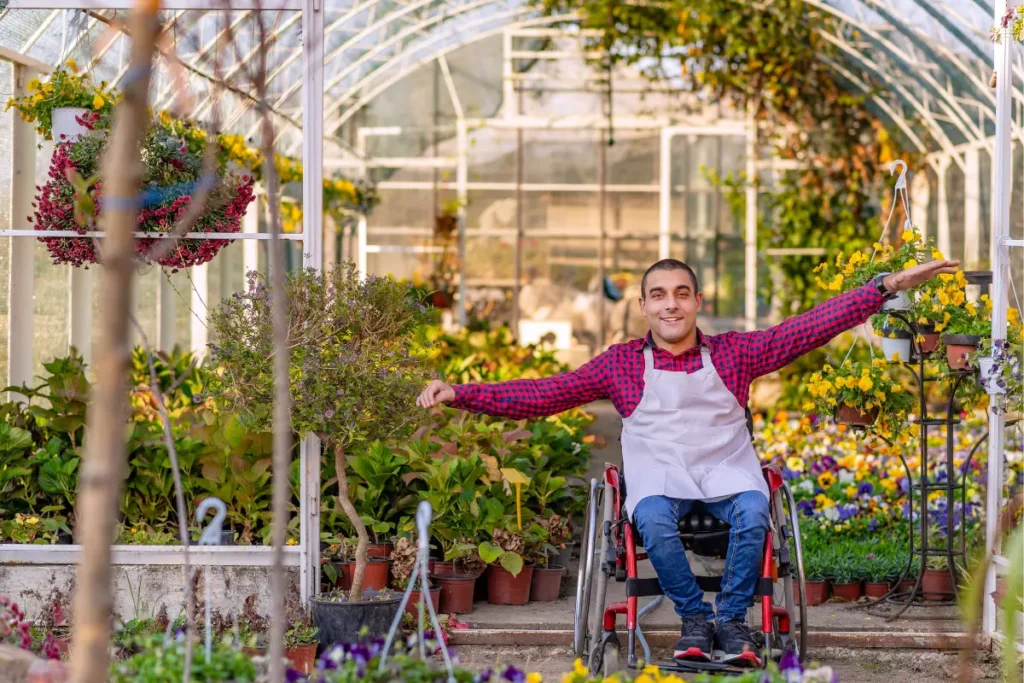
Choosing the Right Containers
Selecting the right containers is crucial for barrier-free gardening. Consider raised beds, hanging baskets, or elevated planters that bring the garden to a comfortable level. These containers should be sturdy and stable, ensuring safety and ease of use. Additionally, containers with wheels can be moved effortlessly, allowing for flexibility in garden design.
Selecting the Perfect Plants
When choosing plants for container gardening for disabled gardeners, opt for those that are low-maintenance and well-suited to confined spaces. Herbs, dwarf vegetables, and colorful annuals are excellent choices. Consider planting aromatic herbs like lavender and rosemary, which engage the senses and provide a delightful gardening experience.
Accessible Garden Design
Creating an accessible garden design involves thoughtful planning. Raised beds and vertical planters should be positioned with ample space between them to accommodate wheelchairs or mobility aids. Wide, smooth pathways make navigation easy, and ramps or gentle slopes can replace stairs for access. Ensure that all elements of the garden are within reach without straining.
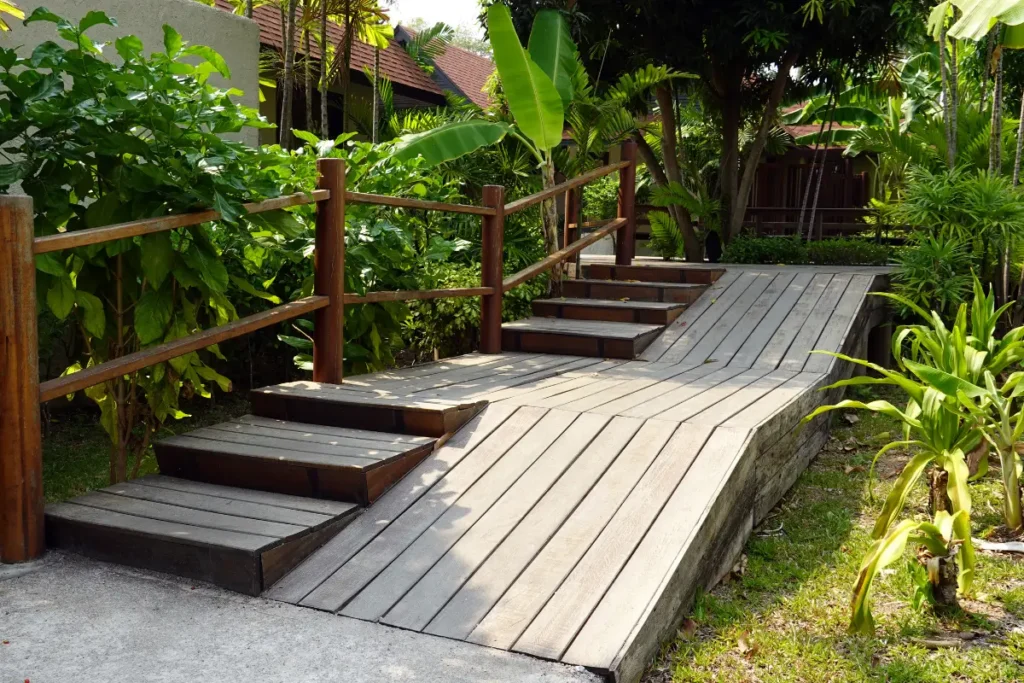
Essential Tools and Equipment
Adaptive gardening tools are essential for disabled gardeners. These tools are designed to accommodate a range of needs, such as ergonomic handles for better grip, extended reach, and tools with built-in seats for those who need to sit while gardening. Additionally, traditional tools can often be modified or adapted for specific requirements.
Recommended Adaptive Gardening Tools
| Image | Title | Prime | Buy |
|---|---|---|---|
 | Garden Tools Set of 3 , Stainless Steel Gardening Kit, Upright Handle Garden Tool Set for Hand Joint Damage/Arthritis, Garden Tools Gifts | PrimeEligible | Check My Price on Amazon |
Top | Bernini Ergonomic Garden Tool Set of 3, Vertical Handle Garden Tools for Arthritis Requires Less Grip Strength for Gardening, Gifts Tools for Men Women (Red) | PrimeEligible | Check My Price on Amazon |
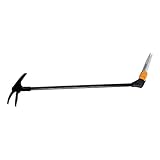 | Fiskars Long-Handled Grass Shears - 36" Handle with 360-Degree Swivel Blade - Garden Shears and Grass Cutter - Black | PrimeEligible | Check My Price on Amazon |
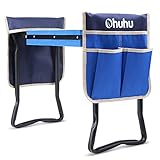 | Ohuhu Garden Stool Garden Kneeler and Seat, Foldable Gardening Bench Heavy Duty with Thicker Wider Kneeling Pad 2 Large Tool Pouches Gifts for Women Men Gardener Parents Elders Friends | PrimeEligible | Check My Price on Amazon |
 | Pruning Shears for Weak Hands for Women Men Heavy Duty Hand Pruner Garden Shears for arthritic Hands Garden Scissors For Gardening, Rose Plants Garden Clippers Gardening Gift for Dad Mom Girl (Silver) | PrimeEligible | Check My Price on Amazon |
Watering and Irrigation Solutions
Watering can be a challenge for disabled gardeners, but there are solutions. Drip irrigation systems and self-watering containers provide consistent moisture, reducing the need for manual watering. These systems can be easily controlled, making it convenient for gardeners of all abilities. See also: Wicking watering system.
Maintenance Made Simple
Low-maintenance container gardening is ideal for disabled gardeners. Choose plant varieties that require minimal pruning and deadheading. Additionally, consider using mulch to reduce weeds and retain moisture, reducing the need for frequent soil tending. Container gardening allows for more focused care on individual plants.
Community and Support
No one should embark on their gardening journey alone. Disabled gardeners can benefit greatly from joining local gardening communities or seeking out online resources and forums. These platforms offer a space to share experiences, exchange tips, and find inspiration from others who have overcome similar challenges.
Success Stories: Stories of Triumph in Container Gardening
Container gardening isn’t just a concept; it’s a life-changing journey that has touched the hearts of many disabled individuals around the world. Here, we share the inspiring stories of three remarkable individuals who have defied physical limitations to discover the wonders of gardening.
Mark Lane: Cultivating Resilience and Creativity
Mark Lane, the UK’s first disabled presenter to join the esteemed BBC Gardeners’ World team, has a compelling story of resilience and passion. Born with spina bifida and diagnosed with myalgic encephalopathy later in life, Mark’s journey into gardening began after a life-altering car accident left him in a wheelchair. He emphasizes, “Gardening has changed my life on a physical, emotional, and mental level.” Today, Mark is not only a celebrated landscape designer but also a renowned writer, garnering numerous awards for his exceptional work. His story is a testament to the transformative power of gardening in the face of adversity.
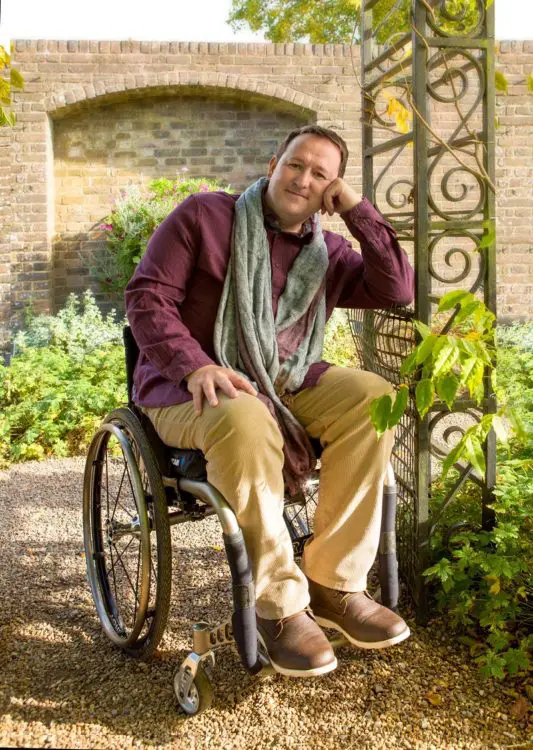
Brandy Schillace: Finding Solace and Wisdom in the Garden
Brandy Schillace, an author and historian with autism and a connective tissue disorder that affects her mobility, discovered her sanctuary in gardening as an adult. She beautifully expresses, “A garden is a grand teacher. It teaches patience and careful watchfulness; it teaches industry and thrift; above all, it teaches entire trust.” Brandy adapted her gardening methods to suit her unique needs and abilities, nurturing her garden with love and dedication. Her story serves as a reminder that the garden is not only a place of growth but also a source of profound wisdom and solace.
Nick Vujicic: Cultivating Purpose and Joy
Nick Vujicic, a renowned motivational speaker and author born without arms and legs due to tetra-amelia syndrome, exemplifies the indomitable spirit of human determination. His mantra, “I don’t need arms and legs, I need purpose and joy,” encapsulates his approach to life. Nick finds solace and connection in gardening, where he cultivates vegetables, herbs, and flowers in his backyard. Remarkably, he uses specially adapted tools operated with his mouth, demonstrating that passion knows no bounds and that gardening is a source of joy, even in the face of profound physical challenges.
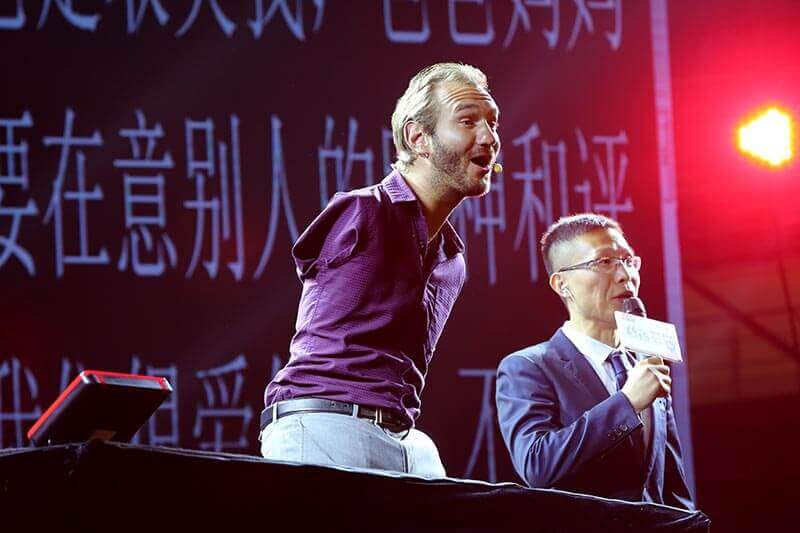
These stories of triumph over adversity highlight the immense potential of container gardening to transcend physical limitations and enrich the lives of disabled individuals. They serve as a reminder that with determination, creativity, and the right resources, gardening can be a powerful tool for cultivating both a beautiful garden and a fulfilling life.
Final Thoughts on Container Gardening for Disabled Gardeners
“Barrier-Free Blooms” is not just a concept; it’s an invitation to embrace the therapeutic and enriching world of gardening regardless of physical limitations. Container gardening for disabled gardeners offers an inclusive and adaptable solution that empowers disabled individuals to connect with nature, cultivate beauty, and enjoy the fruits of their labor. Start your container garden today and witness the magic of barrier-free blooms.
Additional Resources
For further information and support on accessible gardening, consider exploring the following resources:
Recommended Books
| Image | Title | Prime | Buy |
|---|---|---|---|
 | Accessible Gardening | Prime | Check My Price on Amazon |
Top | Accessible Gardening for People With Physical Disabilities: A Guide to Methods, Tools, and Plants | PrimeEligible | Check My Price on Amazon |
 | Landscape Design for Elderly and Disabled People | Prime | Check My Price on Amazon |
 | Gardening (Equipment for Disabled People) | Prime | Check My Price on Amazon |
Online Resources
- Wheelchair Gardening | Tips And Resources | Reeve Foundation: This website offers practical advice on how to garden from a wheelchair, including how to choose the best location, design, and tools for your garden. It also features stories and tips from community members who share their gardening experiences.
- Home – Disabled Independent Gardeners Association: This is a Canadian organization that provides opportunities for people with physical disabilities to actively participate in gardening. They offer workshops, garden tours, customized adaptive tools, and volunteers who work one-on-one with members in fully accessible community gardens.
- Gardening with a disability / RHS Gardening: This is a website from the Royal Horticultural Society, a UK charity that promotes gardening. It provides information on how to garden with a disability, including how to plan, plant, and maintain your garden. It also lists a range of organizations and services that specialize in adaptive gardening techniques, such as Thrive, a charity that uses gardening to improve the lives of people with disabilities.
- Gardening – people with disabilities – Better Health Channel: This is a website from the Victorian Government in Australia that provides health and medical information. It has a section on gardening for people with disabilities, which covers the benefits, challenges, and solutions of gardening. It also suggests some useful contacts and resources, such as Occupational Therapy Australia and the Horticultural Therapy Association of Victoria.
- Home – Gardening With Disabilities Trust: This is a UK charity that aims to help people with disabilities get back into their gardens. They give out grants to help people adapt their gardens to their needs and abilities. They also share stories and tips from people who have benefited from their grants and gardening.
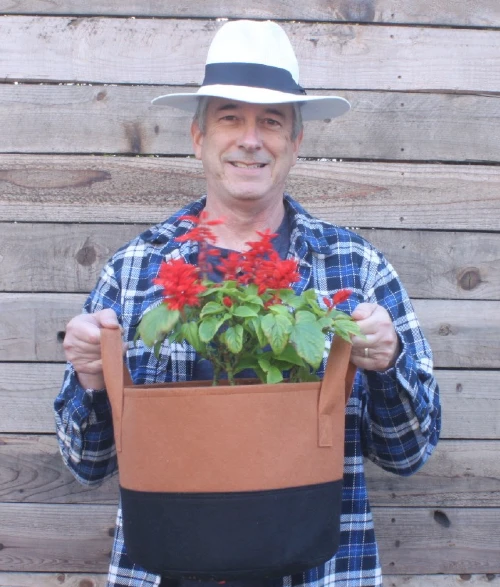
Darrell has a passion for gardening that he inherited from his father. Go here to read more about the influence his father played in his love for gardening. If you want to send Darrell a quick message, then visit his contact page here.
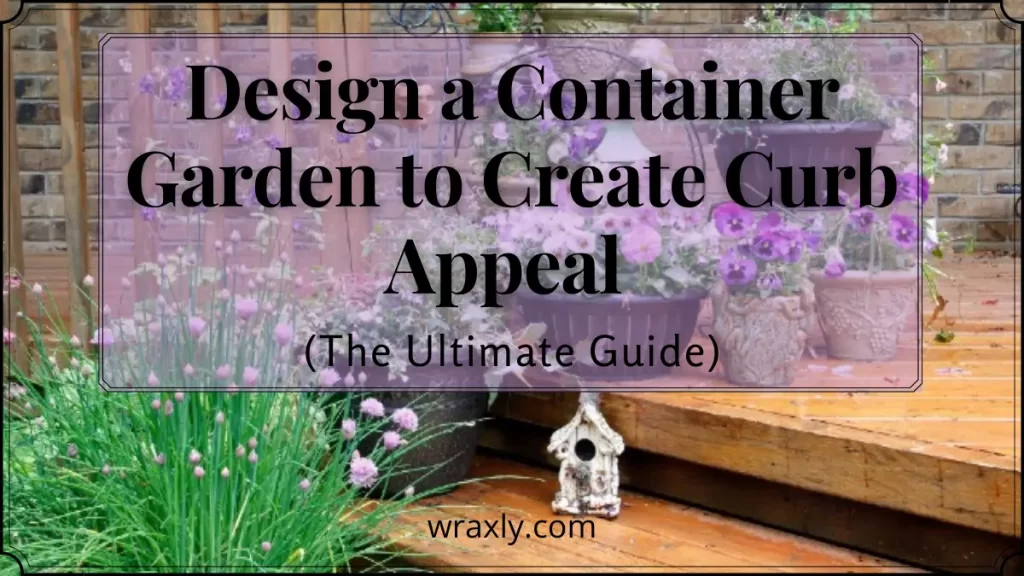
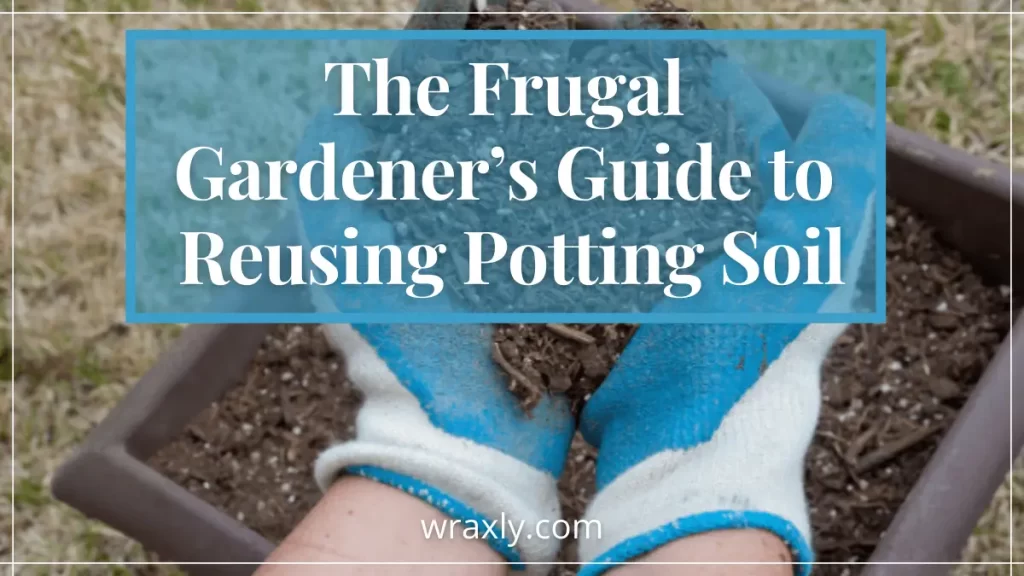
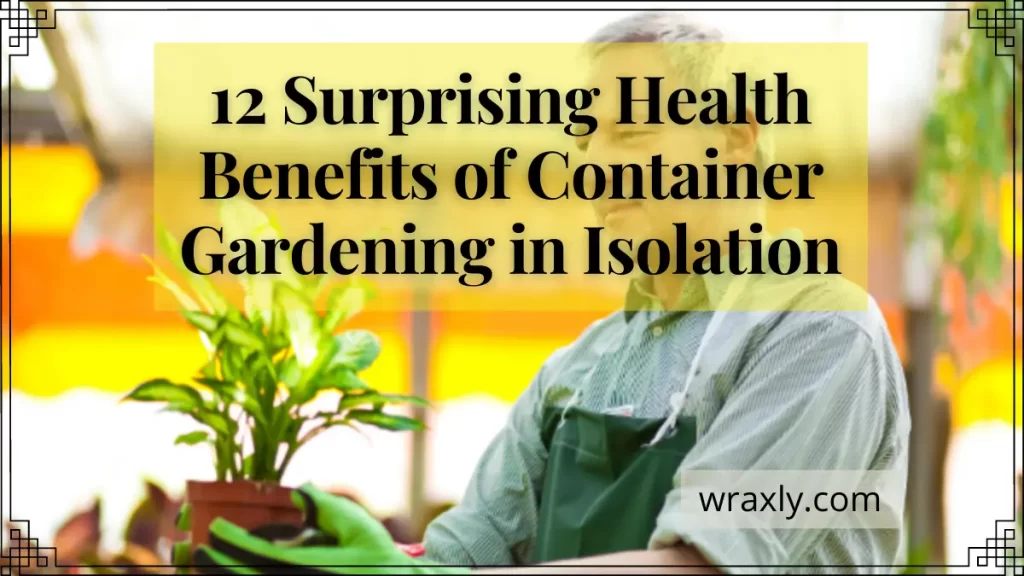
![10 Common Container Garden Mistakes to Avoid [Beginner’s Guide]](https://wraxly.com/wp-content/uploads/2021/02/10-Common-Container-Garden-Mistakes-to-Avoid-Beginners-Guide-1200-1024x576.webp)
